In February, despite citizens’ objections and a petition that contained 75,000 signatures, the Bureau of Land Management (BLM) approved the lease of 26 parcels of public land for possible oil and gas development south of Moab. All the parcels were purchased for more than $4 million. Almost half the money will go to the State of Utah who will then distribute the funds to various agencies that fund projects in Grand and San Juan Counties. The BLM originally considered 48 parcels but deferred 22 of them, mostly for environmental concerns.
Leading the protesters was longtime resident Kiley Miller and her partner, John Rzeczycki. Their concerns ran deeper than most—years ago they were able to purchase a parcel of land from the Utah State Institutional Trust Administration (SITLA) and build a home, completely off the grid. Selling state lands for private homes is, in itself, a policy change for that agency that has led to the promotion and sale of SITLA land parcels in some very unlikely locations.
For Miller and Rzeczycki, the threat of nearby oil and gas projects meant more commercial traffic adjacent to their property and, of greater concern, water contamination. They specifically objected to two parcels near their home. One was removed from the sale for that reason, but the other remained.
In addition, Living Rivers, an environmental group out of Moab, objected to 24 of the 26 remaining leases. All of them were approved by BLM. Spokesman John Wesisheit noted that development of one of the parcels posed a water contamination threat “to residents of Kane Creek, Bridger Jack Mesa, and Brown’s Hole. These homeowners,” Weisheit noted, “have investments in infrastructure that provides clean drinking water. Other investments at risk include depreciation of property values.” Most of these housing developments were also on SITLA lands once used only for grazing and mining but which, recently, as noted, have been developed for their residential real estate value.
In addition to these specific objections, there is a growing movement to reduce or eliminate further oil and gas development in the area via the introduction of a plan to create “Greater Canyonlands National Monument.” Proponents of Greater Canyonlands call for the immediate protection, by presidential proclamation, of 1.4 million acres of public lands adjacent to the national park. According to their literature, “Proposed oil and gas drilling, tar sands exploration, and potash development—some of which would be within sight and sound of Canyonlands National Park—would carve up this wild landscape, harming air and water quality, fragmenting wildlife habitat, and degrading spectacular scenery.”
Moab environmentalist and monument supporter Bill Love wrote,“The area surrounding Canyonlands will be lost to the public unless protected from the extraction industry.” And he pointed out that, “Monument status will protect our tourist economy and hundreds or thousands of jobs.”
Many others share Love’s view and his suggested bottom line—that the scenic beauty of southeast Utah is simply too valuable, measured in tourist dollars, to be degraded and diminished by the extractive industry.
But again, to be the broken record I have become, a tourist/amenities economy is based by definition on the massive consumption of natural resources, especially including oil and gas. Moab City officials released data last month revealing that commercial construction in the community exceeded $16 million in just the first quarter of 2013. The reality is, a tourist economy desperately needs an ever-growing supply of affordable oil to meet expected increases in tourist visitation. But they fear oil exploitation in their area will adversely affect tourism. In their 3 AM hearts, they WANT the oil…but they do NOT want it coming from their own backyards. I posed the question of putting restraints on tourism in Moab to a few prominent locals during a recent facebook discussion and have been suggesting the same idea via this publication for more than 20 years. The silence remains deafening.
So where? Where do we get the oil to keep Moab and the rest of the country rolling? Clearly, nobody wants to live with less. It’s not an idea that’s even remotely considered by politicians or their constituents or even mainstream environmentalists. Long term threats like climate change fall away when it means making a sacrifice or living with less.
But are there places to exploit oil we can all agree on? While advocates of fracking (Where are you, Hal?!) loathe the film and believe its message is seriously distorted, the documentary ‘Gasland’ has raised alarms for many people across the country about the health hazards generated by the hydraulic fracturing process. Critics insist that stories of water faucets catching fire and shooting blue flames across the kitchen are rare. And they may be right. But no one has conclusively proven that water contamination is an impossibility and more evidence is being gathered to suggest that the threat is real.
And EPA data shows that not only is acquifer contamination a real threat, air quality degradation from thousands and thousands of venting condensate tanks is a major concern too, especially when those tanks are concentrated near urban areas. Urbanites will not accept the idea of a harmonious relationship with large-scale fracking next to the neighborhood school.
So where? For much of the year we’ve been living in a very small town on the western Great Plains. The economy here is depressed—our town once boasted 2500 residents; now we barely muster 700–and what economy does survive has been based on agriculture, mostly wheat, milo and cattle.
But the fracking boom came here two years ago and now farmers compete for the one commodity they and the oil companies both need—water. They fear contamination of the water table but more than that, they fear being unable to compete financially for the water. Some, seeing the writing on the wall, have stopped farming and resorted to selling some of their water to the frackers as the only means left to stay afloat financially, at least for now. But here is where the country grows much of its food. Are Americans willing to put at risk the bread basket of the nation to protect their special interests? Should we resort to getting ALL our food from other countries?
So…WHERE do we get our oil? Most of the same people who promote tourism also oppose the Keystone pipeline. And again, the oft repeated irony raises its ugly head. Most environmentalists oppose extraction and speak endlessly of resource degradation and the dangers of climate change and fears that the end of life on this planet as we know it is near. They seek some comfort in deluding themselves with the myth that if we just build enough wind and solar farms and utilize reusable grocery bags that we can restore the life and vitality—and longevity–of the planet and we can keep on consuming as we always have. And recreating. And promoting the endless growth of things like tourism.
It’s a delusion, of course, if not a lie. But no one’s willing to confess to it, at least not in the immediate future.
One of the most basic of economic concepts is the law of ‘supply and demand.’ As demand rises and supplies fall, the price goes up. Conversely, as demand falls and supplies increase, the price drops. If we really reduced our consumption and didn’t get seduced by the lower price, we could change the world. But we won’t. Show me one self-proclaimed environmentalist, of modest means and bills to pay (including me), who doesn’t instinctively jump for joy when the price of gas drops a dime. It’s not going to happen.
So…we can all complain about the world and insist we’re trying to save it, but more often than not, we wage battles on our own behalf. Kiley hates seeing those drill rigs and worries about her water, and Moabites fret that more oil development will mean declining tourist dollars, and environmentalists complain because they get paid to, and I complain because we get sick of the oil companies tearing up the back roads and increasing local traffic. None of us really wants to do anything dramatic..something that might really turn the world around. Many of us think it’s too late for that anyway.
But that won’t stop us from continuing to delude ourselves or going to rallies dressed as forest creatures, or signing online petitions, or ‘liking’ facebook pages that echo our “cause,” or sending twenty bucks to our favorite “green” group, or buying a Prius and a stash of reusable Kroger bags.
Who was it that once said, “If it feels good, do it?” We like to SAY it, even if we never really DO it…and it always makes us “feel” so much better.
Jim Stiles is Co-Publisher of the Canyon Country Zephyr.
To read the PDF version of this article, click here.



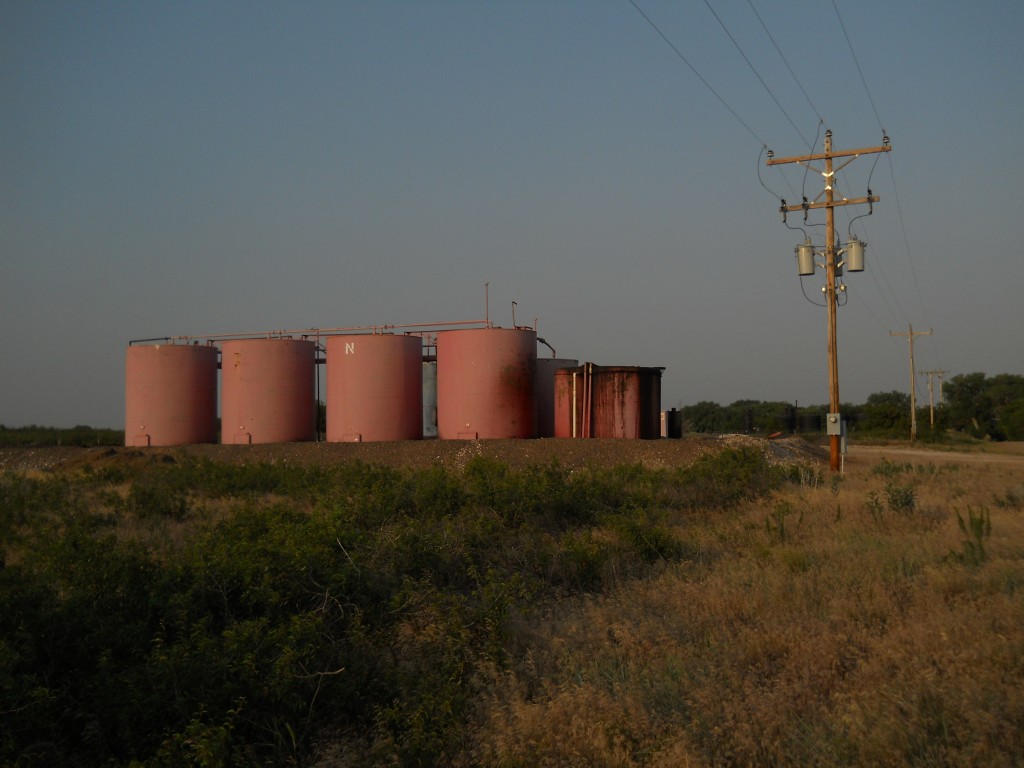
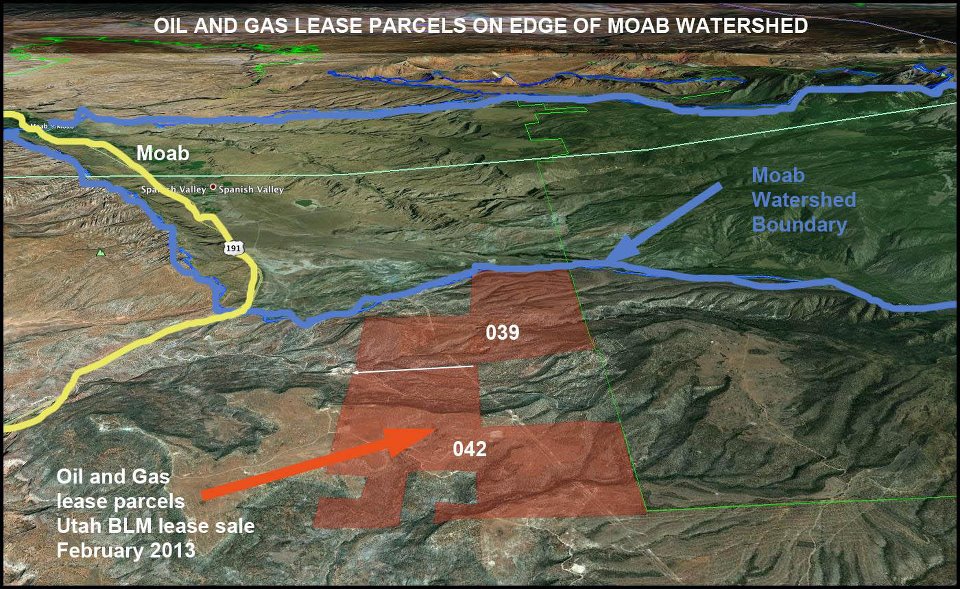

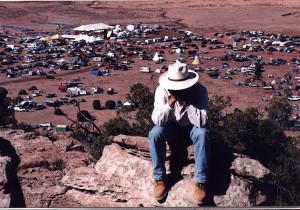
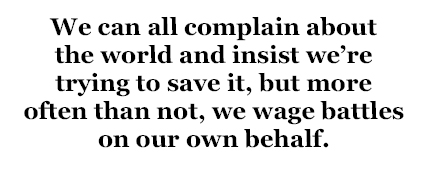
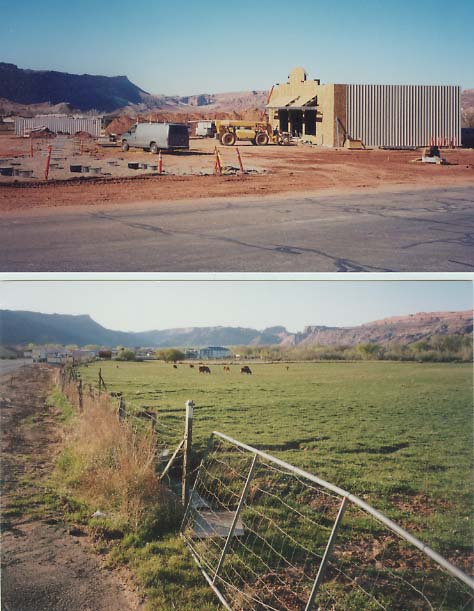

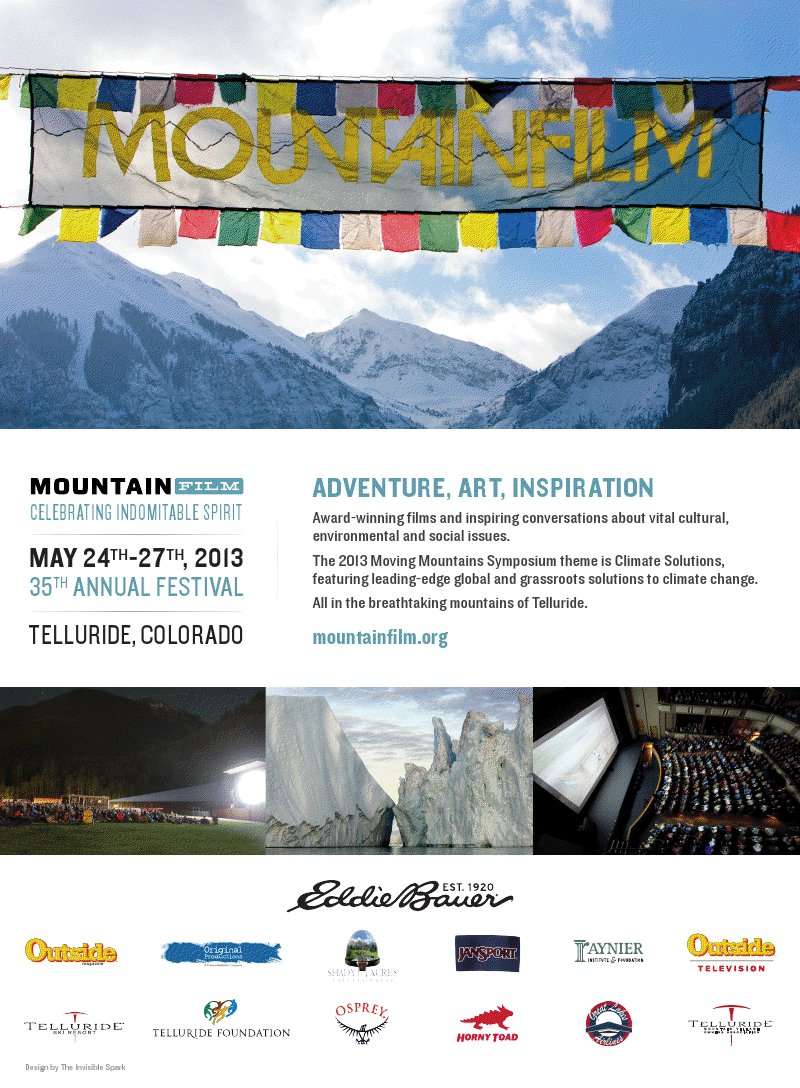


what we can all (?) hope for is that, okay, there’ll be some exploratory drilling, and — whatever resource is identified, will be too expen$$$ive to extract. until, of course, the price of the commodity combined with eventual scarcity goes up …
So, Jim, if even YOU jump for joy when the price of gas drops, then how will we ever change the world?
It’s the illusion of being green that protects us from the real thing: embracing a different way of life.
Please keep being a broken record. It’s thankless but honorable work.
Just so y’all know, the reason I protested this BLM oil and gas auction was because parcel 039 was sitting on Moab’s watershed. Yes, ON it. Parcel 042 was connected to 039 & and yes, both are right next to my land. After reading so much about unconventional fracking, my gut instinct was that there was a great threat to Moab’s water supply and air quality, thus threatening our health and our economy. I decided I had to somehow wave the red flag and alert my community of the threat against it. It was not just about us and drill rigs in our view as well as the added commercial truck traffic. I took the long view which was, “What would happen if Moab’s water was contaminated? What if we started to have our air contaminated by the off gassing from natural gas wells?” Would the BLM have pulled parcel 039 without the negative but factual press that was presented after the community was included? Also the protest letter by Living Rivers et al. meant to protest all the leases and missed two of the parcels on the list. This should not be interpreted as meaning that the protestants were okay with drilling (fracking) these two parcels.
I know first hand the effects of off gassing. It makes people sick. It made me sick. I got sick from being in a canyon in the Lisbon area where natural gas wells were off gassing. It only took minutes to get a headache and nausea. The recovery from both took the better part of a week. You can call me a ‘nimby’ but after feeling what I felt from the off gassing and reading what I have about water contamination, I got scared and decided to do something about it.
As for the consumption argument and living sustainably, we self-built our trickle-down-material home and live off grid on wind and solar. I compost. I recycle. I am not having children. I eat organic, have grown my own food and buy as much local food as I can get my hands on. I started a green cleaning business which ‘eats gasoline’ because I have to drive a lot but I plan all my commutes carefully, carpool with John whenever possible and rarely, waste gas in unnecessary driving. I don’t buy/collect ‘stuff’. I heat my house with wood and solar hot water panels. I cook carefully so as to reduce propane usage. My point is that I am trying my damnedest to “walk the walk” but I ‘aint’ perfect and it isn’t enough.
I agree with a lot of what Stiles says about consumption, tourism, etc. I think there are a great many self-proclaimed “environmentalists” that aren’t doing a fraction of what they should. So, should I keep my mouth shut and not fight the oil and gas corporations, the BLM and the government? Should I not take a stand against certain things because I am a consumer? Sorry but I cant just sit by quietly and watch this earth be raped and pillaged any longer. I have to do something and I am trying.
I’m trying to get ahold of you about Happy Canyon and bikes. Can you email me at dinihill@gmail.com?
The Zephyr’s position that any industrial economy, including one which markets a landscape to tourists who arrived by way of fossil energy, is clearly correct. Any linear system of extraction, consumption, and waste playing out on a finite world cannot last, regardless of how efficient or necessary it may seem to be. Solar energy, for example, requires the mining of both common and rare earth minerals that destroys distant biomes and the lives of those who must live in them, and so is only another version of exporting violence and suffering. If the whole planet isn’t sacred, then none of it is. But that’s where this article ceases being useful or even insightful.
The refresher course in supply and demand economics is especially shallow and patronizing. Obviously oil companies don’t pump and refine oil with no one to sell it to, but as best this is an elementary observation. At worst, it burdens those who would fight exploitation with a false sense of guilt for being entrapped in an abusive system. Is it the fault of a battered woman that she must live, work, and eat in the house of the man who berates, beats, and rapes her? We were born into a culture of power, an arrangement whose infrastructure and social norms require us to work for the barest of necessities. We have to participate, or live miserable lives on the margins of civilization. We don’t share anything but the slightest bit of theoretical culpability for the crimes of those who actually determine what happens. Even if everyone in the whole state of Utah, by some miraculous transformation, chose to stop driving that would not stop a single oil well, in Utah or elsewhere. Anyway, does any reasoning person think that any meaningful number of privileged people will voluntarily surrender their vehicles, no matter how evident the consequences of burning fossil fuels becomes? The Zephyr’s analysis is worthless, has absolutely no strategic value.
So long as the political left persists in viewing civilization as a basically sane collage of individuals whose individual choices determine what happens, and ignores the reality of powerful groups that have arranged themselves in a vast pyramid scheme that has nothing to do with whether I drive or bike to work—then it will never assemble an effective resistance to the environmental emergency, or any other atrocity. Voices like The Zephyr enable this abusive scenario to continue.
It’s basically a one-trick pony: setting up condescending personal attacks against largely disenfranchised citizens such as Kiley Miller and John Rzeczycki whose going against the herd makes them vulnerable to nitpicky criticism. These attacks discourage others from taking on the already discouraging work of challenging power. If we won’t wage battles on our own behalf, we won’t wage them for anyone or anything else, and the only effective ones take place at the point of extraction. Encouraging the masses to make a sacrifice and live with less will never do a single thing. Corporations and states destroy the planet and keep us all enslaved in their rancid hierarchy while ineffectual and cynical commentators “cling hopelessly to the past.” Pitiful. Sometimes I wonder if the powerful are disappointed that we make it so easy for them.
Michael Carter
Deep Green Resistance Four Corners
For so many years, the professional environmental attempt to make itself politically relevant with regards to a fundamentally apolitical problem is what drives me to comment.
As for DGR, the movement superficially references I = P * A * T , but apparently doesn’t see the predicament there. If DGR would explicitly state as first principle that both population and affluence must crash before impact becomes sustainable, then I could respect their point of view. But DGR doesn’t emphasize that awful fact because it would undermine their politics. Ironically, though DGR wants civilization overthrown, their failure to acknowledge that humanity is essentially in a battle with itself makes the group quite mainstream.
Capitalism can’t be beaten politically because it’s the most efficient method of converting resources for human demand in a system that must endlessly grow. And people know there’s no way to stop endlessly growing without huge negative consequences for humanity in the short run. People also know that, should DGR’s revolution succeed, there’s no way the Earth can support 7 billion individual farmers or hunter gatherers either. Both P and A are way beyond carrying capacity, but capitalism is best at leveraging T as the temporary mitigation factor it can only be. (Perhaps DGR has a more Orwellian idea in mind?)
This message doesn’t appeal to anybody, but it’s the truth, and that’s why we keep saying it.
Doug, if you read the DGR book, you will see that they do identify population as a problem. They make the crucial point, though, that a person in America consumes dozens of times that of a person in (for example) Bangladesh. So it is not purely population that is the problem; it is over-consumption. In other words, Americans who live in the lap of luxury can’t point the finger at all those poor people with “too many” children as the problem. Probably no number of people can live as opulently as the average American, in the long run.
Also, DGR does not want to overthrow industrial civilization for some sick ideological “Orwellian” reason, as you imply. Their point is that the population is in overshoot and will crash eventually, no matter what. Their idea is that the sooner industrial civilization quits turning the living world into dead commodities, the better the chances for all living things.
I hope this clarifies :>)
Jim, about your article. I’m going to tell you what I think, and hope that we are still on speaking terms afterward…
I fear that the good points of your analysis get lost in your bitterness and cynicism and (to be frank) sloppy journalism.
You wrote: “Show me one self-proclaimed environmentalist, of modest means and bills to pay (including me), who doesn’t instinctively jump for joy when the price of gas drops a dime. It’s not going to happen.”
Um, yes it is going to happen. It already does. I personally do a little “jump for joy” when the gas price goes UP. And since I’m not a unique and beautiful snowflake, I’m sure I’m not the only one. I wish it would hit $5. Yes, it will make my life harder; my family of four lives off of about $26,000/year, and that’s gross, not take-home. But I am pretty sure that nothing will change systemically until there is sufficient financial incentive. And systemic change is what we need. Michael is right. There is never going to be a movement based on individual consumer choice strong enough to stop the earth from being destroyed.
Jim, if you actually knew Kiley and John, or had bothered to interview them before writing this article, you would know that they actually agree with you about the tourist economy and a host of other things (as Kiley wrote in her comment on the article). You can toss the disparaging term “NIMBY” around, but the truth is that most of us have no power whatsoever in the world at large, but we do have a little bit of control over what happens in our local “back yards”. So that is where we focus our efforts.
Also, you talk about “mainstream environmental movement” as if it were one thing, but really that is an umbrella term for a bunch of different groups. In Moab, those groups are
1) People who are involved because they truly want a healthy planet and a just society.
2) People who make a lot of money from the tourism industry. Tourism is mighty big business around here, and they have realized they can ally with environmentalists and use them to fight their main competition, which are the extractive industries (oil and gas, potash, uranium, etc.) The mainstream environmental groups around here have basically been annexed by Big Tourism, as you often point out.
3) Rich people who want to have beautiful places just for them. They also use environmentalists to fight their battles.
It is not always easy to tell who is who. And many people don’t fit neatly into one category. AND people probably aren’t clear themselves about which category they fall into. Lots of people imagine they are in Category 1, but are really more in 2 or 3…
And what is up with your unwillingness to acknowledge that LOTS OF OTHER PEOPLE BESIDES JIM STILES RECOGNIZE CONSUMPTION AS THE UNDERLYING ISSUE. DGR. Earth First!. Ozzie Zehner, the author of the book “Green Illusions”. James Howard Kunstler. That’s just to name a few, and there are many more.
The above mentioned people/groups also realize that the issue is systemic and its not purely a problem of every single person on earth being incorrigibly greedy and hypocritical. (And in this article it sounds like you think that, Jim). Consumption drives production, but it is also true that PRODUCTION drives CONSUMPTION.
Have you ever tried to live without using fossil fuels? I have. Walking everywhere, you realize quickly that the human world has been designed for cars. If you are healthy and can manage to live close enough to your work and stores, you can swing it. But where are you going to work that doesn’t use fossil fuels and other resources in an unsustainable way? What are you going to buy at the store that didn’t get produced and distributed using tons of fossil fuels? It’s not like people could easily make good choices, and just choose not to do so.
This isn’t even getting into the massive dis-information campaigns about recycling, green energy, vegetarianism, etc. that have people confused about what sustainability even looks like. Or that none of us have ever experienced or even witnessed a sustainable society.
The deck is hugely stacked against us, and it is deeply unfair to say as you do in your article, “None of us really wants to do anything dramatic..something that might really turn the world around. ”
You couldn’t be more wrong.
Heila, I didn’t learn anything from your reply; you repeated my points so I guess you didn’t follow my meaning. (The A in the IPAT relation is Affluence, thus Consumption.) Since Lierre Keith is clearly a human-centered political leftist (quite well versed, did you read DGR?) and since DGR doesn’t talk about any massive population and affluence crash resulting from bringing down civilization, one could infer they’re thinking Orwellian thoughts, no? Of course I’ve got tongue-in-cheek; what I really think is that DGR is just mainstream environmentalism, ie, an inherent contradiction. Put it this way, as long as DGR represents the very best of “bobo americanus” thinking, then the line of future Barack Obamas running for president will be very long indeed.
I encourage anyone reading this thread who is not familiar with DGR to investigate it for yourself, and see if you agree with Doug’s interpretation. I do not agree.
I am quite sure that DGR is NOT affiliated with the Democratic party or support Obama. I am also quite sure that DGR DOES recognize that there would be a “massive population and affluence crash resulting from bringing down” civilization. Their argument is that this will happen no matter what, because civilization is fundamentally unsustainable and will collapse eventually. They maintain that the sooner civilization (and they have a very specific definition of what “civilization” means) comes to an end, the less degraded the planet will be, and therefore the better the chances for life (human and not) to continue in civilization’s wake.
I have serious concerns about the possible unintended consequences of DGR’s strategy. But I don’t like them seeing them misrepresented as “Orwellian”. So don’t take Doug’s word for it about what DGR is. Heck, don’t take MY word for it. Read the book “Deep Green Resistance” and decide for yourself.
Well now we’re getting somewhere Heila. I agree, people should read the book. I notice that you said “I am also quite sure DGR DOES recognize that there would be a “massive population and affluence crash resulting from bringing down civilization.” But then in the very next paragraph you said you’re worried about “possible unintended consequences DGR’s strategy.” Huh? That sounds like confusion to me, and there’s a very good reason for that confusion: DGR does not dwell at all on the issue. They don’t want to talk about it. It doesn’t make a good topic for motivational gatherings. Instead, DGR wants to talk about human rights issues, rights that can only be guaranteed by civilization, yet they want to bring civilization down! The impression they leave is that they hope 7 billion people can somehow survive and feed themselves after the collapse of the civilization that that leverages the dense power of fossil fuels in order to grow everybody’s food. That outcome would lead to the Orwellian scenario I referenced, again, tongue in cheek.
Read the book for yourselves, anyone following this thread, and see if you think DGR has a well-thought out plan for what happens after the revolution is complete. And if they don’t, and their silence is an acknowledgement that billions must die prematurely, then you’ll see why DGR’s “above ground” political advocacy today is patently absurd.
Deep Green Resistance calls their strategy the “last, best hope” for a reason. It only makes any sense if you believe that without forcing industrial civilization to stop raping the planet, that there is no hope at all. It is akin to a terminally ill patient choosing to have a high-risk surgery, even though they may die on the operating table.
Of course, it is a small group of people making that choice for everyone, and that has major ethical issues, to say the least. The authors do go to great lengths to say that any actions should be “ethical and strategic”, and I hope that any underground activity that may be inspired by that book will adhere firmly to those principles, and will be to stop the destruction of life rather than participate in it.
This conversation is a little bit surreal, but I feel a need to add that DGR the book does go into detail about what a post-civilized world might look like, for example at page 388 where Derrick Jensen answers the question, “Civilization is the only thing keeping violent criminals from raping/killing people like in those horrible places far away. Who will protect my family if we dismantle civilization?” Lierre Keith goes onto to sketch a scenario in Chapter 15, “Our Best Hope,” starting on page 477. What Doug Meyer’s bitterness indicates to me is a fundamental misunderstanding of what we’re talking about. As Jensen writes on page 390, “Civilization is a specific, hierarchical organization based on ‘power over.’ Dismantling civilization, taking down that power structure, does not mean the end of all social order. It should ultimately mean more justice, more local control, more democracy, and more human rights, not less.” Unless Meyer thinks that such a small organization as DGR could engineer an Orwellian takeover, or that we’re stupid enough to think this ourselves, I have to conclude that the same old cultural imperialism and arrogance is what’s really at work here: that our culture, the one that builds civilization (where our numbers are so concentrated we must steal resources from distant locations), is the only relevant culture, the only strategy that can possibly ensure a decent life for all its participants. The awful paradox of civilization is of course that the very opposite is true. This is also its greatest weakness. I also point this out over and over again in my own book, and it’s what we continue to repeat and repeat and repeat. This is part of our work as anti-civilization activists. But of course what we say is not at all the same as what others choose to hear.
Michael Carter
I wanted to clear up any misunderstanding that DGR is silent concerning population. As an example, Derrick Jensen replies to a question about millions of people dying:
“No matter what you do, your hands will be blood red. If you participate in the global economy, your hands are blood red because the global economy is murdering humans and non-humans the planet over. A half million children die every year as a direct result of so-called “debt repayment” from non-industrialized nations to industrialized nations. Sixty thousand people die every day from pollution. And what about all the people who are being forced off their land? There are a lot of people dying already. Failing to act in the face of atrocity is no answer.”
And this:
“When someone says, ‘A lot of people are going to die,’ we’ve got to talk about which people. People all over the world are already enduring famines, but for the most part they are not dying of starvation; they’re dying of colonialism, because their land and their economies have been stolen. We hear all the time that the world is running out of water. There is still as much water as there ever was, but 90 percent of the water used by humans is being used for agriculture and industry. People are dying of thirst because the water is being stolen.”
(read more of Derrick’s response here: http://www.deepgreenresistance.org/faq/millionskilled/)
DGR is not a mainstream environmental movement. The goal of DGR is to deprive the rich of their ability to steal from the poor and the powerful of their ability to destroy the planet. This will require defending and rebuilding just and sustainable human communities nestled inside repaired and restored landbases. DGR is about fighting for the world we love. For more information about DGR see the website: http://www.deepgreenresistance.org/whatisdgr/.
Susan Hyatt
Deep Green Resistance Sonoran
Susan…Thanks for your comments and I have no quarrel with any of your observations or references. I’ve quoted Derrick Jensen often in The Zephyr. For reasons beyond my ability to comprehend, however, DGR’s Four Corners representative, Mr. Michael Carter, continues to bewilder us with his bizarre angry rants, even when we basically agree. He goes to great lengths to manufacture an argument. We understand that the masses are NOT going to rise up and voluntarily do the right thing. In this particular story, I noted, “It’s not going to happen.” What part of that did Mr. Carter fail to understand?
All we’ve done here, on several occasions, is to make the simple observation that population and consumption are the two driving forces destroying our planet. Carter bewilderingly takes exception. Previously on the Zephyr facebook page, Carter fumed, “When we blame consumers for production, we’re equating dependance on a system with complicity in a crime, and I think that disarms dissent. This is the last thing we need, since there’s so little dissent to begin with.”
So, if I follow this correctly, he dreads going to the source of the problem for fear he’ll offend the consumers?
Carter claims to be an “anarchist” but then aligns himself (wittingly or unwittingly) with the very corporate powers DGR is attempting to stop. He imagines himself a cutting edge radical but then supports mainstream organizations and institutions funded by massive gifts from corporations and billionaire land rapers
In his last series of almost interminable rants on the Zephyr fb page Carter wrote, “There simply is no future in industrialism.” Okay…But then he defends his Moab NGO-funded pals who suck up chump change from bankers and industrialists and venture capitalists arguing, “I do see the value in those who can finance $50k in lawsuits… (why) should we reject a legal remedy if it’s financed by someone we find objectionable?” (His reference is to an ongoing complaint from this publication about a particularly loathsome venture capitalist named David Bonderman who builds coal plants in Texas and exploits workers around the globe)
But we have to ask…when did an “anarchist” look for “legal remedies” funded by ruthless rich people who spend $10 million on their own birthday party??? Michael Carter, the Radical Cutting-Edge Anarchist, wants to go to court??? What happened to the anarchist’s rule—isn’t he supposed to rebel against any kind of authority, established order, or ruling power? But DGR’s rep from the Four Corners apparently condones blood money from companies who crush unions, who laugh at the notion of ‘climate change’ and devastate the land, from Texas to Malaysia.
You wrote that the purpose of DGR is to “deprive the rich of their ability to steal from the poor and the powerful of their ability to destroy the planet.” Exactly. Yet Mr. Carter seems to think that if one of the mega-rich offers his mainstream enviro pals a few coins toward a cause he supports, it in no way compromises his or their broader goals. We disagree.
Ultimately Michael Carter is all over the map and does DGR a disservice by attaching his name and distorted, erratic, spleen ventings to your cause.
Jim Stiles, publisher
The Canyon Country Zephyr
To reply point by point…I don’t “rep” DGR. I’m only a coordinator in this region, and my views don’t necessarily reflect those of other DGR activists or of the organization in general. So while I casually remark on my personal Facebook page that my political views are anarchistic, this doesn’t reflect on DGR. Generally anarchists dislike DGR, evidently because of our hierarchical structure and because of a personal problem with Derrick Jensen. I’m not interested in this conflict, because I think it’s the same old horizontal hostility among the left. Nevertheless, it’s worth mentioning, because Jensen also does not represent DGR. If you want to understand the strategy, then read the book. By snidely drawing from an online profile (nowhere in my commentary do I make a point of anarchism), Stile seems to be following his usual tactic of personal attack, versus situational analysis.
“All we’ve done here, on several occasions, is to make the simple observation that population and consumption are the two driving forces destroying our planet.” The reason I take exception to this is it’s only a facet of the problem, one with no point of leverage. By distracting attention to consumer choices, the Zephyr is undermining the will of individuals and groups–whose decisions he’s free to disagree with–to fight against the systems of capitalism and bureaucracy where decisions about resource extraction are actually made. As I’ve repeated, over and over again. So why does the Zephyr, if it understands systemic change won’t originate in personal decisions, continue to beat that tired old drum? I don’t “dread going to the source of the problem for fear he’ll offend the consumers,” since I have no fear, I simply don’t think going to this source will accomplish anything. We will only stop burning oil if it’s made unavailable. It will only be made unavailable through political and physical opposition.
Nor have I ever aligned myself “wittingly or unwittingly) with the very corporate powers DGR is attempting to stop.” Nor do I imagine myself a “cutting edge radical,” or “supports mainstream organizations and institutions funded by massive gifts from corporations and billionaire land rapers.” I defend any action, however “mainstream,” that is effective. This doesn’t mean I don’t critique mainstream organizations. In my book
Kingfisher’s Song, I spend an entire chapter critiquing mainstream actions. This is why I’m a member of DGR and not, say, Greenpeace; but if I’m waving my black flag and spitting on the sincere efforts of those whose effectively fight destruction in court or other conventional venues, then all I’m doing is being the hypocrite Stiles so enjoys accusing others of being. The Center for Biological Diversity wins court battles beyond count, and protects land and species, more than I ever have. The State of Utah may well be what stops the Southern Nevada Water Authority groundwater pipeline. The Community Environmental Legal Defense Fund, a DGR ally, aids communities to protect their land bases through litigation and legislation. I ALSO support a strategic, organized underground movement that could physically dismantle industrial infrastructure, a thing the Sierra Club will never do, but if I then scorn a legal fight that can save a river, I’m being just another tedious holier-than-thou radical who has no real concern for results. I don’t see the contradiction here. Results count most, we get them in a variety of ways, but the one way we’ll never get them is in convincing the masses to stop consuming oil or electricity. Seriously, do you see a way that could work? What, going door to door? Let me know how that goes.
“There simply is no future in industrialism,” I said, but who exactly are my “Moab NGO-funded pals who suck up chump change from bankers and industrialists and venture capitalists?” Kiley Miller? Living Rivers? Never once do I mention Bonderman. I don’t think this is so hard to understand–there’s more discernment needed here. This Zephyr article is just sloppy journalism and personal bitterness. I think what really needs to be kept in focus is results. There’s a reason we constantly quote Lierre Keith where she says “The task of an activist is not to navigate systems of oppressive power with as much personal integrity as possible; it is to dismantle those systems.” By any means necessary. So while I share Stile’s distaste for corporate environmentalism, and also occasionally take aim at its co-opted strategy, I also understand that nothing is more important than the land, and the life it supports. I don’t really care how we protect it, whether by lawsuit or underground action. How exactly is this “all over the map?”
If Stiles wants to understand a serious strategy, he should read the book Deep Green Resistance, and perhaps do a book review if he still feels we’re missing some point. This would be a much better service to the land and those who would defend it than publishing personal attacks and dead-end analyses.
Michael Carter
Jim, thanks for your response.
While it is true that we as a society need to transition to a sustainable way of living, that doesn’t mean that our personal consumption choices can stop the destruction. Capitalism drives consumption which drives population growth. Population is not the root of the problem, nor is individual consumption. Industrial civilization is the root of the destruction.
To quote Derrick again, “I don’t believe that ‘we’ are what’s wrong. What’s wrong is capitalism, and civilization. Those in power want us to focus on ourselves. That’s why movies like Al Gore’s emphasize personal “solutions” like inflating tires or not driving. The key is to destroy the infrastructures and institutions that drive the destruction. We need to stop the culture from killing the planet. We need to stop capitalism.”
I agree with Michael Carter that blaming the consumer disarms dissent. Feeling guilty and buying “green” products (as an example) diverts individuals away from more meaningful actions. The only way to stop the destruction is “through political and physical opposition.” We need everything at this point if we are going to stop the escalating destruction of Earth. I support any action that stops the destruction.
I don’t think it makes sense to put “restraints on tourism in Moab” in order to reduce fossil fuel consumption. This is like treating the symptom instead of treating the disease, and in our case the disease called capitalism is killing our world. If capitalism and industry are dismantled, there will be no consumption of fossil fuels and no need to fight against fracking.
“Where do we get the oil to keep Moab and the rest of the country rolling?” No matter where the oil comes from, if this country keeps rolling it is going to roll over life as we know it. If we stop the death machine now we may have to give up our privileged way of living, but if we don’t stop the machines we will be sacrificing our very lives and/or the lives of our children. Do we want to kill the living world for a few privileges? Or do we want a future living world? We can’t have both.
Climate change is no longer a long term threat, many scientists are predicting human extinction in the near future, as soon as 2030 (other species are currently going extinct at an average of 200 a day, a rate as high if not higher than the great extinction events of the past) and signs of accelerating climate change are becoming more and more common. See the essay written by Guy McPherson, professor emeritus at the University of Arizona, for a great summary of current climate change predictions, http://guymcpherson.com/2013/01/climate-change-summary-and-update/.
What can we do to stop deluding ourselves? I don’t think asking “where do we get our oil?” is the right question to be asking. What is the right question to be asking? The masses may never rise up, but how can we encourage those who do care to take meaningful actions?
Lierre Keith was right when she said, “I think the biggest reason otherwise radical people don’t want to face the necessity of ending industrial civilization is privilege. We’re the ones reaping the benefits. We’ve sold out the rest of life on earth for convenience, creature comforts, and cheap consumer goods, and it’s appalling. I’m sickened by this bargain.”
Personally, I wish the economy would crash today and the price of gas spike to a level no one could afford, because I don’t think most people will give up privilege until it becomes a necessity. We don’t need oil in order to survive, but we do need clean water and a healthy ecosystem to live in.
Susan Hyatt
At least this conversation has revealed what we suspected: that DGR are not terrorists. I see very progressive, human-centered comments from both Michael and Susan. And no Michael, my defense of immoral and unsustainable capitalism is simply that it provides conditions for the maximum number of people to be alive temporarily on the planet (at the expense of everything else alive on the planet.) That’s the definition of overshoot. Bringing civilization down will kill most of those people because grass-fed beef won’t support a population anywhere near 7 billion. I accuse DGR of failing to “face the scale of the horrors” which Lierre Keith fails to do even though she wrote that on page 477. All of the DGR’s explicitly political efforts, as long as they avoid the issue of a mass human die-off resulting from the success of DGR’s strategy, are not just absurd, they’re lies…even greenwash!
And that’s why DGR is best classified as just another mainstream group trying to make people believe that there are good solutions to the global warming problem. I wouldn’t be surprised if some wealthy benefactors start throwing money your way. As long as you keep spreading the illusion that the world’s problems could be fixed by getting rid of the bad apples at the top (the very essence of politics), you’ll be the ones keeping to the status quo.
Like it or not, Jim, my crystal ball says fracking is coming soon to a neighborhood near you. There are powerful forces at work in them thar canyons … and money to be made. And the worse thing … the worse thing the rich man does: he pays the poor man to do his dirty work, thereby enlisting the natives to destroy their own mother. It’s sad, my Kentuckian friend, but true. Oh so true.